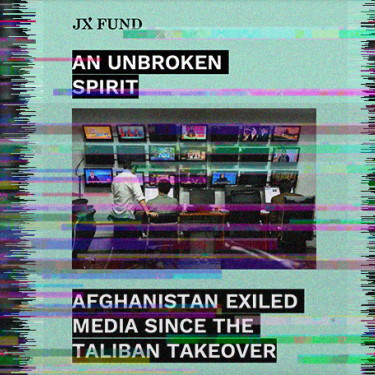Afghanistan: RSF calls for continued support for media in exile, essential sources of information in the face of censorship in the country

Afghan media in exile remain economically fragile, even though they are a widely followed source of information, according to a report by the think tank for media professionals, The Fix, and the support fund for journalism in exile, JX Fund, created in 2022 by Reporters Without Borders (RSF) and its partners.
Since the Taliban regained power in August 2021, and while the media and journalists in the country have been repressed, nearly fifty media in exile have emerged, run by Afghan journalists who have sought refuge abroad.
These dynamic and diversified media have found their audience and continue their mission of informing the Afghan audience from a distance. However, for most of these media, their long-term survival is still in the balance, remaining largely dependent on donor funding. They are also subject to political pressure in Afghanistan from the Taliban, who repress their collaborators.
These are the findings of the study An Unbroken Spirit: Afghanistan Exiled Media Since The Taliban Takeover, published last July by the JX Fund, a support fund for journalism in exile, in collaboration with specialist media researchers from The Fix Research and Advisory. The JX Fund has compiled an innovative database enabling continuous monitoring of these media.
"The return of the Taliban to power in August 2021 has sounded the death knell for press freedom in Afghanistan, and the crackdown on journalists has intensified over the months. Local media now live in a climate of fear and are forced to broadcast news controlled by the regime. The role of the media in exile is therefore crucial in delivering uncensored information to the Afghan audience. RSF calls for continued support for these media, an essential source of information for Afghans.
Exiled media score big viewing numbers
Faced with the imposition of increasingly heavy-handed censorship by the Taliban, Afghans have turned to independent media in exile to access reliable information - 47 media outlets counted by the JX Fund Dashboard, 57% of which were founded in Afghanistan and continue to operate from outside the country, and 42% of which have since been created abroad. They publish mainly on websites and social media. On YouTube, these media garnered 36 million views in April 2024, while 6 million people on Facebook follow Afghan media in exile. And given the importance of television in Afghanistan, due in particular to the low penetration of the Internet and illiteracy in the country, 27% of the media covered by the JX Fund study offer television formats.
While nearly 80% of Afghan women journalists were forced to quit the profession after the Taliban took power, female journalists in exile have joined or founded media outlets on various platforms, such as the online media Quqnoos TV or Rukhshana Media, the investigative medium Zan Times, and numerous podcasts and radio stations enabling Afghan women to make their voices heard.
Uncertain financial survival
These media in exile remain fragile: 90% of their budget comes from donor funding, making them vulnerable in the long term, according to the JX Fund study. Following relocations to higher-cost countries, mainly Germany, Canada and the United States, their budgets have doubled between 2022 and 2024. And television production is proving particularly expensive.
These media must therefore develop a sustainable model to ensure their long-term survival. The authors of the report recommend creating a five-year strategy with donors, diversifying funding, reducing expenditure and outsourcing certain services, as well as opting for specialisation by focusing on strategic editorial choices.
Constant repression
In addition to economic pressure, the Taliban are cracking down on local correspondents and sources of exiled media. According to the JX Fund report, it is becoming increasingly difficult to verify information on the ground. Most media in exile rely on citizen journalism and anonymous sources. Ensuring the safety of journalists in Afghanistan working with these exiled media is therefore crucial.
Since the Taliban took power three years ago, press freedom has been openly flouted. Journalists have to comply with numerous rules and directives, and live under the threat of arrest by the Taliban security forces, in particular the General Directorate of Intelligence (GDI).
Afghanistan is ranked 178th out of 180 countries in RSF's World Press Freedom Index for 2024.
